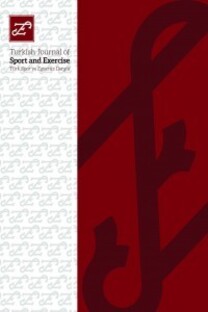The study of the effect of the individual perception of justice (belief in a just world) on degree of decisionmaking of students of the faculty of physical education and sport sciences
The study of the effect of the individual perception of justice (belief in a just world) on degree of decisionmaking of students of the faculty of physical education and sport sciences
___
- 1. Avşaroğlu S, Üre O. Üniversite Oğrencilerinin Karar Vermede Özsaygı. Karar Verme ve Stresle Basacıkma Stillerinin Benlik Saygısı ve Bazı Degişkenler Açısından Incelenmesi. Selçuk University J Institute of Social Sciences, 2007; 18: 85100.
- 2. Bağırkan Ş. Karar Verme. İstanbul: Der Yayınları.1983.
- 3. Borg WR. Educational Research New York: David McKay Co. Catherine Soanes. Oxford English Dictionary. Oxford University Press. 2007. New Delhi. P. 22, 1985.
- 4. Brown EJ, Mann L. The relationship between family structure and process variables and adolescent decision-making. Journal of Adolescence, 1991; 13: 2537.
- 5. Can H. Organizasyon ve Yönetim (7. Baskı). Siyasal Kitabevi, Ankara, 2005.
- 6. Carney C, Wells C. Discover the Career Within You. New York. Cole Publishing Company, 1995.
- 7. Çolakkadıoğlu O. Ergenlerde Karar Verme Ölçeğinin (Adolescent Decision Making Questionnaire) uyarlama çalışması. Master Thesis, Çukurova University, Adana, 2003.
- 8. Dalbert C. The world is more just for me than generally: About the personal belief in a just world scales validity. Social Justice Research, 1999; 12: 7998.
- 9. Deniz ME. Investigation of the relation between decision making self- esteem. Decision making style and problem solving skills of university students. Eurasian Journal of Educational Research, 2004; 15: 2335.
- 10. Furnham A, Proctor E. Belief in the just world: review and critique of the individual differences literature. British Journal of Social Psychology, 1989; 28: 365-384.
- 11. Güçray SS. Bazı Kişisel Değişkenler Algılanan Sosyal Destek ve Atılganlıgın Karar Verme Stilleri İle İliskisi. Psikolojik Danısma ve Rehberlik Dergisi, 1998; 2(9): 716.
- 12. Goldberg JH, Lerner JS, Tetlock PE. Rage and reason: The psychology of the intuitive prosecutor. European Journal of Social Psychology, 1999; 29: 781795.
- 13. Göregenli M. Siddet, kotu muamele ve iskenceye iliskin degerlendirmeler, tutumlar ve deneyimler. Iskencenin Onlenmesinde Hukukcuların Rolu Projesi Raporu. Izmir, 2003.
- 14. Hafer CL, Bègue L. Experimental research on just-world theory: Problems. developments. and future challenges. Psychological Bulletin, 2005; 131: 128167.
- 15. Koçel T. İşletme Yöneticiliği. İstanbul, Beta Basım, 2001. 16. Kuzgun Y. Karar stratejileri ölçeği: geliştirilmesi ve standardizasyonu. VII. Ulusal Psikoloji Kongresi Bilimsel Çalışmaları. 161170. Ankara, 1992.
- 17. Lerner MJ. The Belief in a Just World: A Fundamental Delusion. New York: Plenum Press, 1980.
- 18. Lerner MJ. Pursuing the justice motive. M. Ross and Date T. Miller Eds. In: The justice motive in everyday life. New York: Cambridge University, Press, 2002.
- 19. Lipkus IM, Siegler IC. The belief in a just world and perceptions and discrimination. J of Psychology, 1993; 127: 465474.
- 20. Mann L, Radford M, Burnett P, Ford S, Bond M, Leung K, Nakamura H, Vaughan G, Yang KS. Cross-Cultural Differences in Self-Reported Decision- Making Style and Confidence. International Journal of Psychology, 1998; 33: 325335.
- 21. Mitchell LK, Krumboltz YD. Research on human decision making: Implications for career decision making and counseling. In R. W. Lent. & S. D. Brown (Eds). Handbook of Counseling Psychology. A Wiley- Interscience Publication, USA, 1984.
- 22. Otto K, Dalbert C. Belief in a Just world and its function for young prisoners. Journal of Research in Personality, 2005; 39: 559573.
- 23. Pepitone A, L‟Armand, K. The justice and injustice of life events. European Journal of Social Psychology, 26. 581 597.1996.
- 24. Sinangil K.H. Yonetici Adaylarında Karar Verme İle Kaygı İliskileri. VII. Ulusal Psikoloji Kongresi Bilimsel Çalışmaları. Ankara: Turk Psikologlar Dernegi Yayınları, 1993.
- 25. Tasdelen A. Öğretmen Adaylarının Farklı Psiko Sosyal Değiskenlere Göre Karar Verme Stilleri. Doctoral Thesis, Institute of Education Sciences, Dokuz Eylul University, Izmir, 2002.
- Yayın Aralığı: 3
- Başlangıç: 1999
- Yayıncı: Selçuk Üniversitesi, Spor Bilimleri Fakültesi
Motor skills in pre-school education and affects to 5 year old children’s psychomotor development
Ugur SENTURK, Malik BEYLEROGLU, Faruk GUVEN, Atike YILMAZ, Hakan AKDENIZ
An analysis of leadership characteristics of search and rescue volunteers
Burak GURER, Ilhan ADILOGULLARI
Evrim CAKMAKCI, Fatma ARSLAN, Hüsamettin VATANSEV, Meryem AYRANCI
Gökhan ACAR, Rezzan DEMIRCI, Gulsum YILMAZ, Buket KAYAOGLU
Vishaw GAURAV, Amandeep SINGH, Sukhdev SINGH
